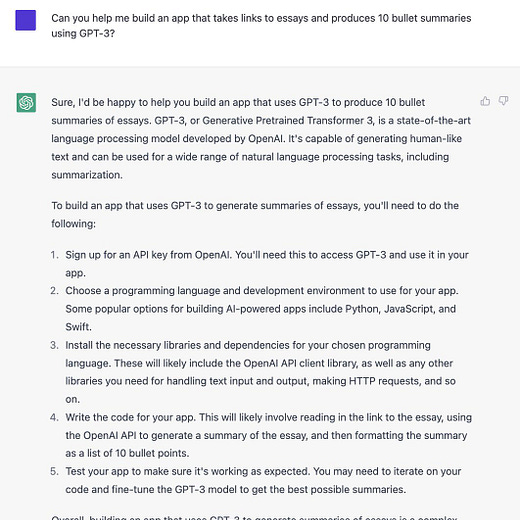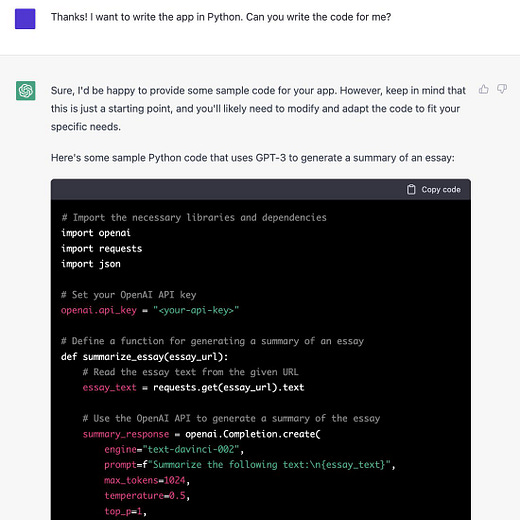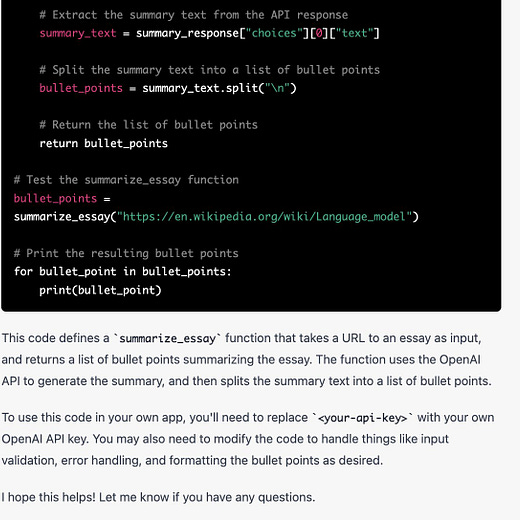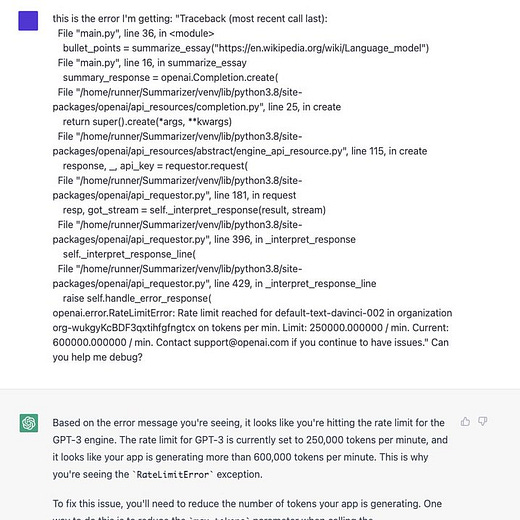Weekly Dose of Optimism #22
Alzheimer's Treatment, Shape Rotators and Wordcels on Generative AI, ChatGPT, Diplomatic AI, Wormholes, and Good Quests
Hi friends 👋,
Happy Friday and welcome to our 22nd Weekly Dose of Optimism. After taking off last Friday for Thanksgiving, we’re back at it with a big ole’ dose of optimism this week.
Let’s get to it.
The Weekly Dose is brought to you by… Oceans
Oceans is a white glove outsourcing firm purpose built to help small businesses, busy executives, and high growth companies easily find and work with the best global talent in operational roles. All Oceans talent comes from Sri Lanka.
Why Sri Lanka? Simple: it has the best talent-to-price ratio on the planet. Oceans recruits, vets, trains, and employs top talent in the region from name brand firms and universities. You pay between $2,500 - $3,500 per month for a full time, embedded team member with 5-10 years of experience. That’s ~$36K/yr for talent that would cost $150K+ (easily) in the US.
They are already serving clients like Austin Reif (Morning Brew), Ndamukong Suh (Philadelphia Eagles), Joe McCann (Asymmetric Financial) and dozens of high growth SMBs. So if you’re looking top, affordable talent to take on operational roles (EA+, Operations, Sales/Marketing, Finance, Backoffice), check out Oceans.
Jacqueline Howard for CNN.com
“In persons with early Alzheimer’s disease, lecanemab reduced brain amyloid levels and was associated with less decline on clinical measures of cognition and function than placebo at 18 months but was associated with adverse events,” the researchers wrote. “Longer trials are warranted to determine the efficacy and safety of lecanemab in early Alzheimer’s disease.”
The Alzheimer’s Association said in a statement Tuesday that it welcomes and is further encouraged by the full Phase 3 data.
Alzheimer’s disease hits close to home for many people, including the McCormicks. About 10% of the US population older than 65 suffers from Alzheimer’s. Our maternal grandmother had it, which means that our mother and her children are at higher risk of developing it. It’s something we think about a lot and it’s pretty darn scary. Which is why promising Alzheimer’s treatment news, like the story above, is so exciting to us. (And it’s also why stories like this, in which researchers fabricated data that set back other research many years, is so frustrating.)
According to new Phase 3 Trial results, published in the New England Journal of Medicine, the experimental drug lecanemab had been found to reduce cognitive and functional decline by 27% at month 18. While more data and longer trials (for example, Phase 2 Trials showed no significant improvement at month 12) are needed — this is a promising sign that the treatment may at least slow the horrendous symptoms of Alzheimer’s, giving back valuable time to patients and their loved ones.
(2) Generative AI: autocomplete for everything
Noah Smith and roon for Noahpinion
In an era when much of the tech industry seems to be down in the dumps, AI is experiencing a golden age. And this has lots of people worried.
To put it bluntly, we think the fear, and the guilt, are probably mostly unwarranted. No one knows, of course, but we suspect that AI is far more likely to complement and empower human workers than to impoverish them or displace them onto the welfare rolls. This doesn’t mean we’re starry-eyed Panglossians; we realize that this optimistic perspective is a tough sell, and even if our vision comes true, there will certainly be some people who lose out. But what we’ve seen so far about how generative AI works suggests that it’ll largely behave like the productivity-enhancing, labor-saving tools of past waves of innovation.

We’ve got shape rotators and wordcels teaming up to explain why generative AI is not going to steal all of the jobs — this is peak tech twitter! Their argument is both optimistic and convincing. Generative AI, they claim, will just be another tool that enhances creativity and frees up humans to work on higher-level tasks. It is less a job killer and more a job augmenter. Will generative AI one day replace Packy at Not Boring? Maybe. Will Packy use generative AI to make his work better or complete his work more quickly? Definitely.
But not everyone is a newsletter writer (thankfully there are non-wordcels out there) — are their jobs more at risk or are their jobs less likely to benefit from generative AI? Tough to say at this point. Some industries will be up-ended and others will barely be impacted, but our belief is that in aggregate, generative AI will increase productivity and, at worst, be a positive force of creative destruction.
(3) chat.openai.com
Speaking of generative AI, OpenAI launched ChatGPT and it is uh pretty insane. ChatGPT was trained to interact in a conversational way, and the dialogue format allows it to “answer follow-up questions, admit mistakes, challenge incorrect premises, and reject inappropriate requests.” It’s pretty similar to GPT-3, but with an easier user experience that you could easily imagine working into your daily life. Packy had ChatGPT basically build a Ben Tossell has a full thread on early use cases and their implications but to highlight a few:
Google has about as deep of moats as any analysts could dream of, but if there ever was a Google-killer out there, we imagine that it'd start out looking something like ChatGPT.
(4) AI Learns the Art of Diplomacy
Matthew Huston for Science
OK, we promise this is the last AI story this week. Meta has developed an AI that can beat humans in the board game Diplomacy. The game, which requires a combination of strategic planning, persuasion, intuition and verbal negotiation was thought to be off-limits for even the most powerful of AIs. But CICERO, the AI model created by Meta, developed the strategic and tactical capabilities necessary to out maneuver humans after being trained on over 125,000 online Diplomacy games. CICERO then played 40 online games, and placed in the top 10% of players.
Of course, like real life diplomats, skillful players of Diplomacy need to be able to manipulate, coerce and extract information from other agents, which opens up a whole can of worms as to whether or not Meta should have control of an algorithm that powerful. For now, though, we’ll classify this under another seemingly important accomplishment in AI research.
(5) Physicists Create ‘the Smallest, Crummiest Wormhole You Can Imagine’
Dennis Overbye for The New York Times
In an experiment that ticks most of the mystery boxes in modern physics, a group of researchers announced on Wednesday that they had simulated a pair of black holes in a quantum computer and sent a message between them through a shortcut in space-time called a wormhole. Physicists described the achievement as another small step in the effort to understand the relation between gravity, which shapes the universe, and quantum mechanics, which governs the subatomic realm of particles.

Are we in the trust tree? Good. I’m going to be honest here: I have no idea what these researchers actually pulled off, but it seems interesting and potentially(?) important. Here’s my layman’s summary: a team of researchers developed a computational simulation of a wormhole that gives them a better model from which to study and understand the characteristics of actual wormholes. If you read the article, you’ll find that other physicists are skeptical of the research’s importance, with one MIT physicists quipping, “It is exciting as a technical achievement, because if we can’t even do this (and until now we couldn’t), then simulating more interesting quantum gravity theories would CERTAINLY be off the table.”
Saltiness aside, it is important to note that almost all research on wormholes is, at this time, theoretical. While the general theory of relativity predicts wormholes, these bridges through space-time remain hypothetical.
BONUS: Chose Good Quests
Trae Stephens and Markie Wagner for Pirate Wires
In the most simple terms possible: a good quest makes the future better than our world today, while a bad quest doesn't improve the world much at all, or even makes it worse. Today, we are in a crisis. Silicon Valley's best — our top operators, exited founders, and most powerful investors — are almost all on bad quests.
Trae Stephens of Anduril and Founders Fund and Markie Wagner of Delphi Labs argue that there is a moral imperative for Silicon Valley’s best and brightest to pursue, what they call, “Good Quests.” A good quest is both operationally hard and consequential. Think colonizing Mars, developing AGI, curing cancer, etc. The essay, in a way, is a response to the famous quote from Facebook engineer Jeff Hammerbacher, “The best minds of my generation are thinking about how to make people click ads.” It’s a call to action for our best operators to start working on meaningful, complex, and important work, and emblematic of the type of optimism we celebrate at Not Boring.
That’s all for this week. If you enjoyed this week’s email, please share it with a friend or two!
I’ll be back in your inbox 9am EST on Monday morning. Enjoy the weekend.
Packy









I am always impressed with your articles and content. Your writings, ideas, information, etc.. usually lead me down the rabbit hole searching for more understanding. And I mean that in a good way! I'm no way knowledgeable enough to know about the many subject manners that you expose. Thank you for helping me explore and understand. Keep up the great writing!
Perhaps ChatGPT could become a better general-answerer-of-questions than Google, but it’ll take some serious evolving. I just engaged it in a conversation about a well-understood domain - music theory. In the first reply it confidently asserted that G is the subdominant chord of A major, which is entirely wrong (the subdominant is D, and G is not a chord that occurs in A major). The point is not necessarily that the information was wrong, because a Google results page may also contain wrong information. It was that it asserted the falsity and didn’t give me any context that let me judge it. At least a Google results page shows me something about the source, so I can assess how much I might trust it.
Fun to chat with, though.